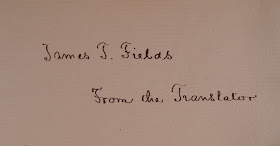 We made another nice find this week in the collections. For a class on Dante in translation, we were digging around our various English language editions of Dante. The catalog record for the first printing of Longfellow's translation tipped us off that it would be something special.
We made another nice find this week in the collections. For a class on Dante in translation, we were digging around our various English language editions of Dante. The catalog record for the first printing of Longfellow's translation tipped us off that it would be something special.Our copy was one of the first ten printed and belonged to Longfellow's publisher, James Fields. It has a little inscription "from the Translator" in one volume. That is pretty impressive, but it has a bonus feature: a holograph copy of Longfellow's sonnet, "On Translating the Divina Commedia," laid in and dated March 29, 1864. Longfellow didn't publish the poem until December of 1864, so this manuscript is an early one that he wrote out for Fields.
It shows Longfellow's stance toward Dante. He compares himself to a laborer, and Dante's work a cathedral. As he works, he stops to pray:
Oft have I seen at some cathedral-doorIf you want to have your own little holy moment with Dante and Longfellow, ask for Fields 16.
A laborer, pausing in the dust and heat,
Lay down his burden, and with reverent feet
Enter, and cross himself, and on the floor
Kneel to repeat his pater-noster o'er;
Far off the noises of the world retreat;
The loud vociferations of the street
Become an undistinguishable roar.
So, as I enter here from day to day,
And leave my burden at this minster-gate,
Kneeling in prayer, and not ashamed to pray,
The tumult of the time disconsolate
To inarticulate murmurs dies away,
While the eternal ages watch and wait.
No comments:
Post a Comment